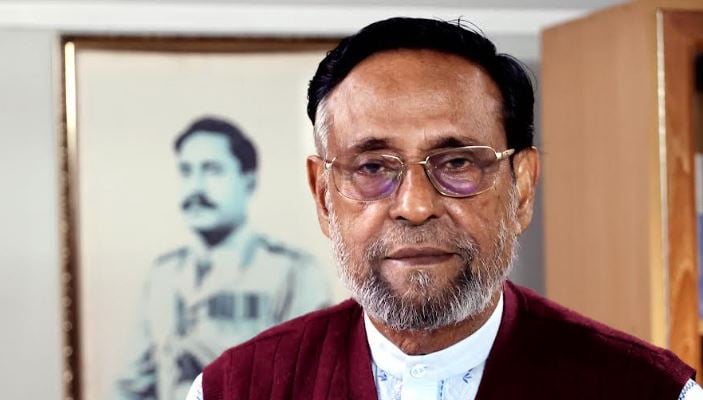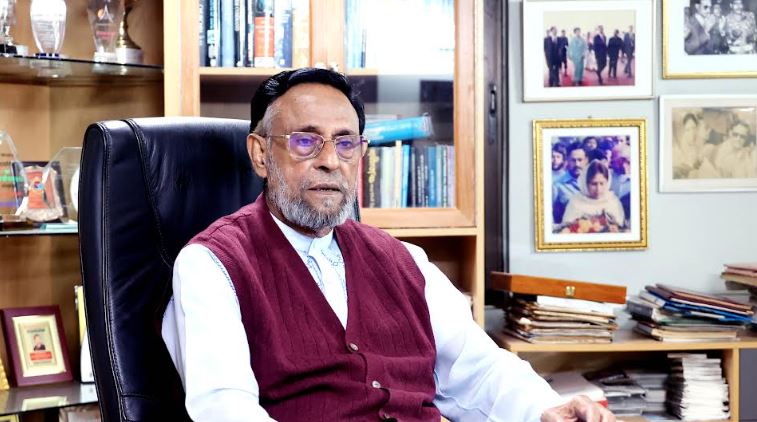
By Mursalin Nomani
DHAKA, Dec 15, 2024 (BSS) - Liberal Democratic Party (LDP) President and former minister Dr. Col. (Retd.) Oli Ahmed Bir Bikram today said he celebrated the moments of final victory of the Liberation War along with the then Z Force commander Ziaur Rahman in Sylhet and the 1st East Bengal Regiment infantry troops in Sylhet.
"We freed Sylhet on December 14, two days before the victory. (But) The Pakistan army refused to surrender to the freedom fighters," he told BSS in an interview at his DOHS residence in the capital's Mohakhali on the eve of Victory Day 2024.
Ahmed said the Pakistani troops had feared that the freedom fighters might not abide by the Geneva Convention to ensure their security and "therefore, they felt comfortable surrendering to the Indian army".
In the morning on December 16, the veteran said, he was staying in a tea garden forest in Sylhet along with Ziaur Rahman when the news broke that Pakistanis conceded defeat.
"December 16 is the greatest and happiest day for the Bangalee nation. After 9 month-long bloodstained Liberation War, we earned a great victory," Oli said.
"We were very happy (at that moment). I consider myself lucky to have participated in the struggle for freedom."
Oli said he was a young officer of the 8th East Bengal Regiment in Chattogram but "I had the experience of fulfilling a historic duty for the people".
He said the experience of revolting against the Pakistani army at the right moment, mobilising the 8th East Bengal Regiment and jumping into the Liberation War with full force along with weapons was very thrilling.
"On the night of March 25, as soon as I received the news that the Pakistan Army cracked down in Dhaka, I was the first to rebel against Pakistan with the 8th Bengal Regiment under the leadership of Major Zia," the army officer turned politician recalled.
Oli said at that time West Pakistani Colonel Abdur Rashid Janjua was the commanding officer of the 8th Bengal while Major Ziaur Rahman was the second in command.
Oli Ahmed said On March 27, Major Ziaur Rahman proclaimed independence from the Kalurghat Radio Station.
"We took the decision for proclamation of independence sitting at Patia Police Station (Chattogram). I told Ziaur Rahman, you go to the radio station (Kalurghat Radio Station)," he said.
The 1971 veteran said Kalurghat radio station at that time was actually a transmitting station but after slight modification it became a broadcasting station.
"There, Ziaur Rahman wrote, I, Major Zia, declare myself as Provisional Head of the State and urge all the countries of the world to support us," Oli recalled.

He said in the declaration Ziaur Rahman also sought recognition of all countries and urged them to provide weapons, food and medicine for the freedom fighters.
According to Oli on the evening of May 30, Ziaur Rahman made another announcement where he said "I hand over power to Sheikh Mujibur Rahman and declare myself the commander-in-chief of the armed forces".
"When Ziaur Rahman proclaimed independence, I was sitting next to him," he said.
Oli also proudly recalled that Ziaur Rahman in 1973 gave him a hand written note saying "Captain Oli Ahmed played a key role in the rebellion".
Describing the proclamation of independence of Bangladesh in detail, Oli said on the morning of March 27, Ziaur Rahman and he arrived at Patiya Police Station.
"A man named Mr. Mahmud came there. He was about 6 feet 2 inches tall. He entered the police station and said who is Captain Oli Ahmed here? We did not have any badges on our shoulders. We were only wearing khaki uniforms," he recalled.
Oli said as the stranger looked for him by name he escorted him to the police station balcony and asked why he was searching for Captain Oli.
"He (Mahmud) replied, Captain Oli has to declare independence. When I asked him why, he said, Oli Ahmed is a son of Chattogram. If he proclaims independence, everyone will come forward unitedly," he said.
Oli said he then informed Mahmud that the man sitting inside the room was Major Ziaur Rahman and he should proclaim independence.
"Then I discussed this matter with Major Zia. Within a short while, Major Ziaur Rahman set off for Kalurghat Radio Station along with Mr Mahmud. I told Major Zia that I would set up the Army Headquarters at Fultala Primary School of Boalkhali Police Station and reach Kalurghat Radio Station within a short while," he said.
Major Zia then wrote down the content for the radio speech, Oli said, adding he made two amendments and Ziaur Rahman accepted them.
Oli Ahmed, also a former member of the BNP Standing Committee, said, basically, this speech of Ziaur Rahman was a guideline for the entire nation and the international world.
Mentioning that the nation will never forget his courageous role, Oli Ahmed said after the proclamation of independence by Major Ziaur Rahman, armed war started against the Pakistanis in various places throughout Chattogram and Bangladesh.
"However, no middle or high-ranking leader of the Awami League was involved in this war. Later, we came to know that Sheikh Mujibur Rahman surrendered to the Pakistanis on the night of March 25 under his own initiative. We fought against the Pakistanis for long nine months," he said.
Recalling the memories of the war, Oli Ahmed said, "On the night of April 13, Major Zia asked me to go to Mirsarai and ordered me to build resistance against the enemy forces heading towards Dhaka and Chattogram."
Oli Ahmed said he arrived at Mirsarai, 35 miles from Ramgarh, in the morning after receiving the instructions.
At that time, he had two platoons of former EPR members and one platoon of newly trained freedom fighters with him, he said adding among the weapons were a three-inch mortar, a machine gun and a 75-millimeter anti-tank gun.
"We adopted guerrilla tactics in the war. We secretly built bunkers on both sides of the road and waited for the Pakistani army at three separate positions there. And we waited for the enemy to attack us," he said.
Recalling the memories of Operation Mirsarai, he said, on the morning of April 19, as a company commander, he went to inspect the preparations for the attack with Naik Faiz Ahmed and saw that Platoon Commander Sirajul Islam and Platoon Havildar were not in their respective bunkers.
They were quickly brought back to their positions after being informed, he said adding after completing the preparations, he was surprised as soon as he got on the Dhaka-Chattogram main road.
"I saw a microbus coming. A little behind it was an ordinary 3-ton truck. A little behind it was a convoy of 20 military trucks coming in a row. Each of them was a truck carrying soldiers. I quickly took cover," he said.
As soon as the entire enemy force entered their position, he opened fire and destroyed the rearmost truck with the 75-millimeter anti-tank gun borrowed from the 2nd East Bengal Regiment.
"Havildar Siddique fired mortars and blew up the three military trucks in the front and middle. Most of the enemy soldiers were killed in their vehicles. My company held the enemy soldiers at Mirsarai from 6 am to 10 pm."
"In the meantime, another platoon of EPR joined us under the leadership of Subedar Saidul. At one stage of the battle, Havildar Siddique, who was in the second position, was injured by enemy fire."
Lance Naik Abul Kalam was also martyred on the spot by an unexpected mortar shell, he said adding four more freedom fighters were injured at that time.
"However, we killed 120 enemy soldiers in this battle and destroyed eight of their military vehicles, which is marked as a special success in our liberation war," he said.
The Bangladesh government conferred gallantry award Bir Bikram on him for playing a courageous role in this battle, he said.